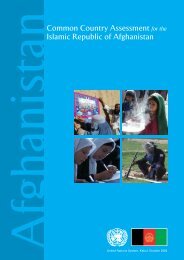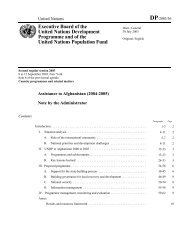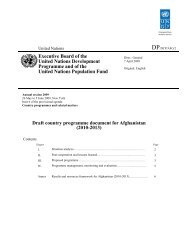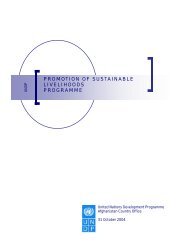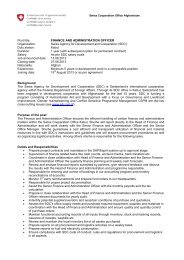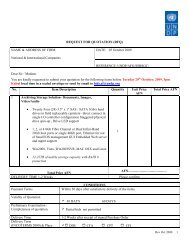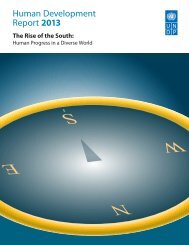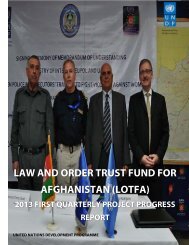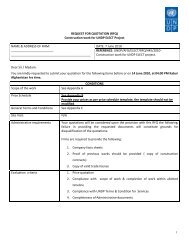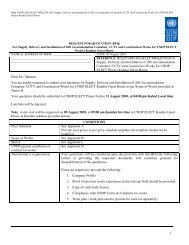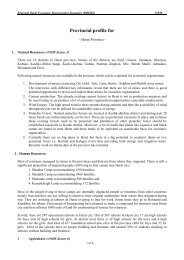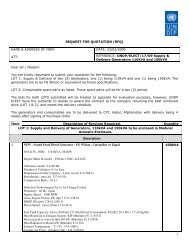GENDER EQUALITY PROJECT - UNDP Afghanistan
GENDER EQUALITY PROJECT - UNDP Afghanistan
GENDER EQUALITY PROJECT - UNDP Afghanistan
Create successful ePaper yourself
Turn your PDF publications into a flip-book with our unique Google optimized e-Paper software.
OUTPUT 1: Policy development capacity of MoWA enhanced through the<br />
establishment of WPDC for ensuring other line ministries to develop and implement<br />
gender sensitive policies/strategies<br />
The focus of Q2 was to deepen support to MoWA in order to improve its capacity as a policy maker<br />
and an oversight body for mainstreaming gender in all Government initiatives. In order to<br />
accomplish this objective, GEP supported and strengthened<br />
Centre (WPDC) by establishing a networking mechanism which allowed WPDC to collect genderdisaggregated<br />
data/information among the nine departments of MoWA 1 . WPDC, in collaboration<br />
with the Central Statistics Office (CSO), prepared a comprehensive report which identified major<br />
gender gaps based on data gathered through the networking mechanism in addition to existing<br />
and available data in CSO. This report was shared with LMs to enable them implement NAPWA<br />
indicators. GEP also assisted in institutionalizing the networking mechanism to ensure this<br />
information was extended to the key LMs for an efficient implementation of the indicators of<br />
NAPWA that have been developed by MoWA. The WPDC also formed an advocacy group within<br />
MoWA which will work with MoWA to analyze the CSO statistical yearbook that is published<br />
annually in order to raise the demand for sex disaggregated data for gender sensitive planning<br />
and formulation of policies by key LMs. A comparative analysis of the statistical yearbooks of<br />
2009/2010 and 2010/2011 was completed in collaboration with CSO and a diagnostic report was<br />
prepared with recommendations for collecting and disseminating further sex-disaggregated data<br />
by the LMs.<br />
To strengt<br />
other ministries, the WPDC also developed gender mainstreaming tools based on the needs<br />
assessment survey of Q1 of Mo<br />
n<br />
Affairs (DoWA) in all 34 provinces. Some of these tools included: Gender Sensitivity Audit Guide,<br />
Gender and Development Mainstreaming Framework and Perception Levels of Knowledge and<br />
Commitment for mainstreaming gender in a systematic manner. These tools will serve as useful<br />
guides for the LMs when implementing NAPWA indicators and ensure gender-specific<br />
components are integrated into their major policies and programmes. The WPDC also completed<br />
the gender analysis of the major policies / programmes of three LMs (MRRD, MoEc and MoHE) as<br />
well as of two independent organizations (IDLG and IEC). These reviews provide MoWA with an<br />
opportunity to guide the revision of existing policies/programmes and supervise the preparation<br />
of new policy documents to make it more gender inclusive.<br />
In addition, GEP continued with its support to the Monitoring and Evaluation (M&E) Unit of the<br />
Ministry. The primary aim of the M&E Unit is to oversee the implementation of the NAPWA<br />
indicators by the LMs. A draft of the M&E mechanism to facilitate this supervision has been<br />
prepared which was revised after obtaining the comments of the senior officials of MoWA and was<br />
re-submitted for the approval of the Deputy Minister - Technical, MoWA. As soon as it is approved<br />
will be rolled out to the line ministries and the provincial offices for implementation and for this,<br />
necessary documents such as information briefs, checklists, and other related documents have<br />
been prepared. A set of guidelines for strengthening the functioning of the Gender Units of the<br />
LMs were prepared and submitted to the senior officials of MoWA for approval.<br />
During Q2, GEP also<br />
management: report writing and communication skills, time management, office conflict<br />
resolution among others. The objective of the training was to familiarize the participants with the<br />
key components of management techniques that would equip them with the skills of an efficient<br />
manager for performing their routine tasks in a professional manner. The training was received<br />
very enthusiastically and the feedback received through an analysis of the evaluation forms of the<br />
participants underpinned the need of organizing such training programmes at regular intervals.<br />
1 Departments: Coordination and International Relations, Provincial Affairs, Training and Advocacy, Finance &<br />
Administration, Economic Empowerment, Legal, Culture & Social Affairs, Human Resources, Coordination<br />
Office of the Minister.<br />
2 | P a g e



